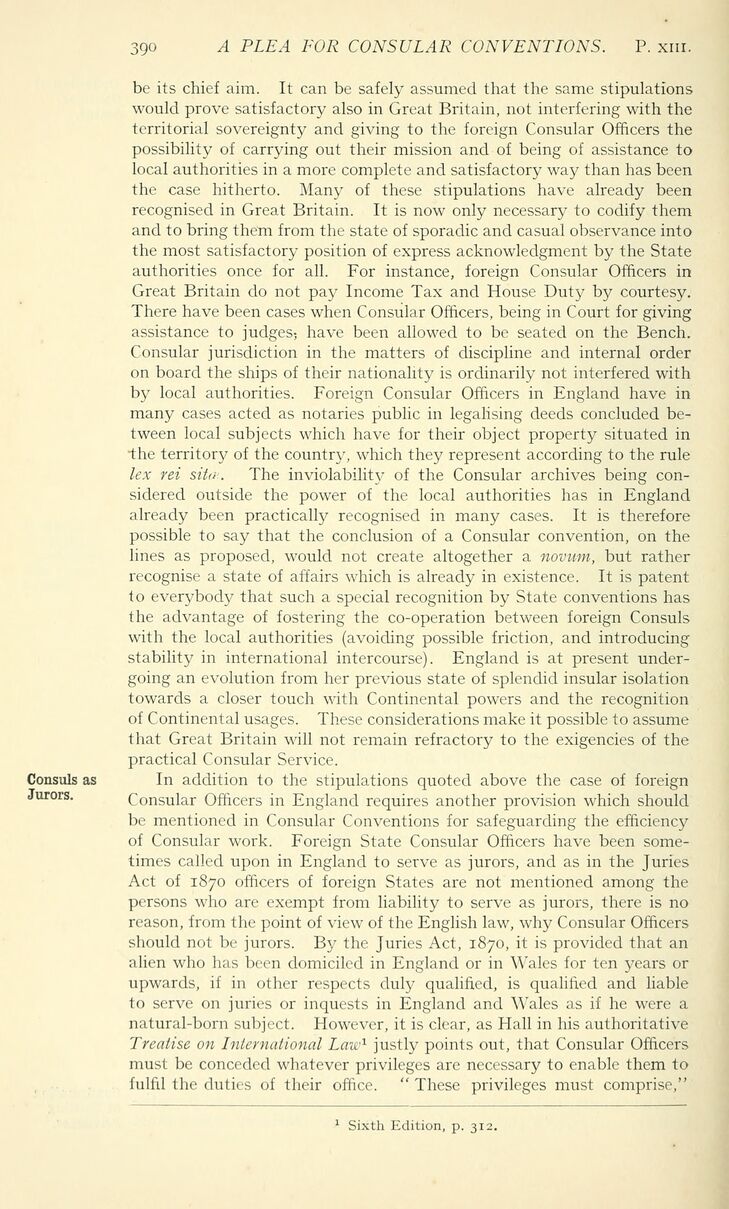
Full resolution (JPEG) - On this page / på denna sida - Pages ... - Part XIII. A Plea for Consular Conventions

<< prev. page << föreg. sida << >> nästa sida >> next page >>
Below is the raw OCR text
from the above scanned image.
Do you see an error? Proofread the page now!
Här nedan syns maskintolkade texten från faksimilbilden ovan.
Ser du något fel? Korrekturläs sidan nu!
This page has never been proofread. / Denna sida har aldrig korrekturlästs.
390 A PLEA FOR CONSULAR CONVENTIONS. P. xin.
be its chief aim. It can be safely assumed that the same stipulations
would prove satisfactory also in Great Britain, not interfering with the
territorial sovereignty and giving to the foreign Consular Officers the
possibility of carrying out their mission and of being of assistance to
local authorities in a more complete and satisfactory way than has been
the case hitherto. Many of these stipulations have already been
recognised in Great Britain. It is now only necessary to codify them
and to bring them from the state of sporadic and casual observance into
the most satisfactory position of express acknowledgment by the State
authorities once for all. For instance, foreign Consular Officers in
Great Britain do not pay Income Tax and House Duty by courtesy.
There have been cases when Consular Officers, being in Court for giving
assistance to judges-, have been allowed to be seated on the Bench.
Consular jurisdiction in the matters of discipline and internal order
on board the ships of their nationality is ordinarily not interfered with
by local authorities. Foreign Consular Officers in England have in
many cases acted as notaries public in legalising deeds concluded
between local subjects which have for their object property situated in
•the territory of the country, which they represent according to the rule
lex rei sito’. The inviolability of the Consular archives being
considered outside the power of the local authorities has in England
already been practically recognised in many cases. It is therefore
possible to say that the conclusion of a Consular convention, on the
lines as proposed, would not create altogether a novum, but rather
recognise a state of affairs which is already in existence. It is patent
to everybody that such a special recognition by State conventions has
the advantage of fostering the co-operation between foreign Consuls
with the local authorities (avoiding possible friction, and introducing
stability in international intercourse). England is at present
undergoing an evolution from her previous state of splendid insular isolation
towards a closer touch with Continental powers and the recognition
of Continental usages. These considerations make it possible to assume
that Great Britain will not remain refractory to the exigencies of the
practical Consular Service.
In addition to the stipulations quoted above the case of foreign
Consular Officers in England requires another provision which should
be mentioned in Consular Conventions for safeguarding the efficiency
of Consular work. Foreign State Consular Officers have been
sometimes called upon in England to serve as jurors, and as in the Juries
Act of 1870 officers of foreign States are not mentioned among the
persons who are exempt from liability to serve as jurors, there is no
reason, from the point of view of the English law, why Consular Officers
should not be jurors. By the Juries Act, 1870, it is provided that an
alien who has been domiciled in England or in Wales for ten years or
upwards, if in other respects duly qualified, is qualified and liable
to serve on juries or inquests in England and W,Tales as if he were a
natural-born subject. However, it is clear, as Hall in his authoritative
Treatise on International Law1 justly points out, that Consular Officers
must be conceded whatever privileges are necessary to enable them to
fulfil the duties of their office. " These privileges must comprise,"
1 Sixth Edition, p. 312,
Consuls as
Jurors.
<< prev. page << föreg. sida << >> nästa sida >> next page >>